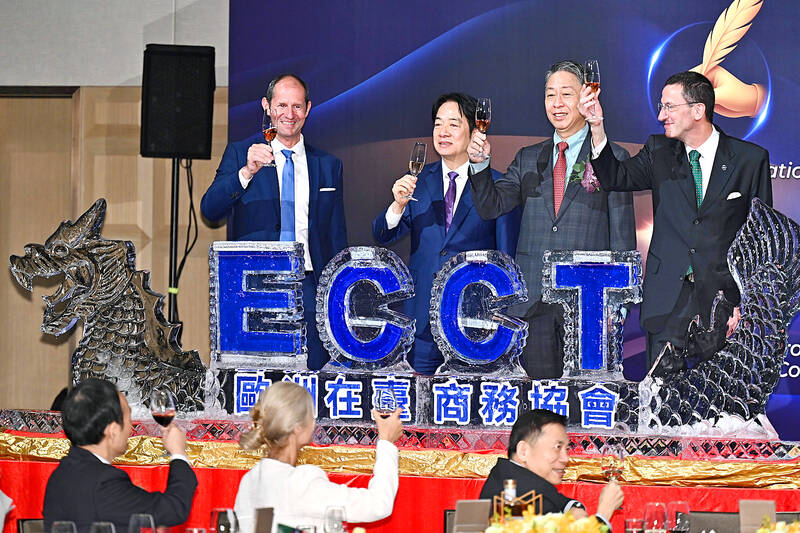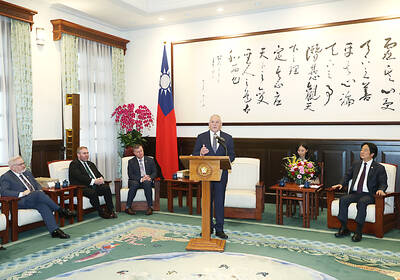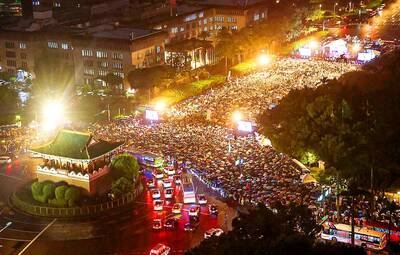President William Lai (賴清德) and the EU’s representative, Lutz Gullner, yesterday pledged to deepen cooperation on semiconductor supply chains and security amid growing global challenges.
Speaking at a gala hosted by the European Chamber of Commerce Taiwan, Lai said Taiwan would continue working to strengthen economic ties with European partners and “jointly build resilient, promising and non-red supply chains” for semiconductors.
The president warned against threats from authoritarian regimes trying to dominate global semiconductor and critical technology markets through non-market practices, resource monopolies and price subsidies.

Photo: Tu Chien-jung, Taipei Times
Besides expanding economic ties, Taiwan is also eager to collaborate with democratic partners to safeguard freedom, democracy and regional peace while strengthening its own defense capabilities and resilience, president Lai said
Gullner, who heads the European Economic and Trade Office in Taiwan, echoed the need for closer cooperation between Taiwan and the EU in “building stronger, resilient, innovation-driven and secure supply chains.”
Bilateral cooperation should extend beyond economic matters, Gullner said, highlighting growing alignment between the EU’s security priorities and Taiwan’s, and emphasizing the opportunity for both to jointly address hybrid threats and strengthen civil defense.
“We should work together also in those areas to counter cyberattacks, disinformation or foreign information manipulation, economic coercion; and we need to protect our critical infrastructure,” the EU envoy said.
“This is not just between the administrations,” he said, adding that “we need to have private sector and business involvement in this [cooperation].”
The gala was attended by hundreds of guests, including senior Taiwanese government officials and heads of foreign representative offices in Taipei, according to the chamber, which represents the interests of about 450 European companies operating in Taiwan.

‘NON-RED’: Taiwan and Ireland should work together to foster a values-driven, democratic economic system, leveraging their complementary industries, Lai said President William Lai (賴清德) yesterday expressed hopes for closer ties between Taiwan and Ireland, and that both countries could collaborate to create a values-driven, democracy-centered economic system. He made the remarks while meeting with an Irish cross-party parliamentary delegation visiting Taiwan. The delegation, led by John McGuinness, deputy speaker of the Irish house of representatives, known as the Dail, includes Irish lawmakers Malcolm Byrne, Barry Ward, Ken O’Flynn and Teresa Costello. McGuinness, who chairs the Ireland-Taiwan Parliamentary Friendship Association, is a friend of Taiwan, and under his leadership, the association’s influence has grown over the past few years, Lai said. Ireland is

FINAL COUNTDOWN: About 50,000 attended a pro-recall rally yesterday, while the KMT and the TPP plan to rally against the recall votes today Democracy activists, together with arts and education representatives, yesterday organized a motorcade, while thousands gathered on Ketagalan Boulevard in Taipei in the evening in support of tomorrow’s recall votes. Recall votes for 24 Chinese Nationalist Party (KMT) lawmakers and suspended Hsinchu City mayor Ann Kao (高虹安) are to be held tomorrow, while recall votes for seven other KMT lawmakers are scheduled for Aug. 23. The afternoon motorcade was led by the Spring Breeze Culture and Arts Foundation, the Tyzen Hsiao Foundation and the Friends of Lee Teng-hui Association, and was joined by delegates from the Taiwan Statebuilding Party and the Taiwan Solidarity

An SOS message in a bottle has been found in Ireland that is believed to have come from the Taiwanese captain of fishing vessel Yong Yu Sing No. 18 (永裕興18號), who has been missing without a trace for over four years, along with nine Indonesian crew members. The vessel, registered to Suao (蘇澳), went missing near Hawaii on Dec. 30, 2020. The ship has since been recovered, but the 10 crew members have never been found. The captain, surnamed Lee (李), is believed to have signed the note with his name. A post appeared on Reddit on Tuesday after a man

Instead of threatening tariffs on Taiwan-made chips, the US should try to reinforce cooperation with Taiwan on semiconductor development to take on challenges from the People’s Republic of China (PRC), a Taiwanese think tank said. The administration of US President Donald Trump has threatened to impose across-the-board import duties of 32 percent on Taiwan-made goods and levy a separate tariff on semiconductors, which Taiwan is hoping to avoid. The Research Institute for Democracy, Society, and Emerging Technology (DSET), a National Science and Technology Council think tank, said that US efforts should focus on containing China’s semiconductor rise rather than impairing Taiwan. “Without